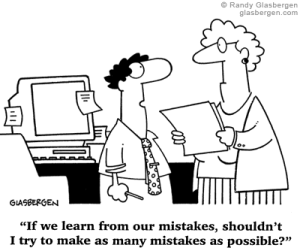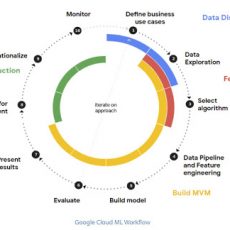As a leader in Sales Operations, I have had the privilege of working with 10 Salesforce Administrators. None of them majored in Salesforce in college. None of them even started their career in the Salesforce ecosystem. Only one of them ever held a job in sales. I doubt any of them told their parents they want to be a CRM superhero when they grow up. So what makes them special and where do they go from here?
Are you currently a Salesforce Administrator pondering your next move? Unsure whether to go for the next Salesforce certification or consider leveling up your career in Sales Operations? While the Salesforce path is well laid out, the map for branching out into Sales Operations and eventually a leadership role (e.g. Manager, Director, of VP) is less clear.
Everyone has their own origin story, but nearly every successful Salesforce Administrator and Sales Ops Professional I have encountered has the following 3 traits. I have also listed 3 career tips at the bottom with a slant towards Salesforce and Sales Ops.
Bonus: You can still work in Salesforce even if you’re in Sales Ops!
3 Traits for Success
This list is not intended to be exhaustive, but rather highlights the 3 characteristics which I believe are pivotal to success in roles that improve sales effectiveness and sales efficiency.
- Curiosity
- Empathy
- Patience
Curiosity: Learning is a prerequisite for building. How can you create something more effective or efficient if you don’t learn a better way to do it? Simply leveraging existing practices or maintaining the current state really doesn’t add incremental value to an organization. Sales Operations add value when they improve the world around them.
We live in a world with countless resources to learn. Knowledge is no longer reserved for the few or financially advantaged. But you need to be curious (and committed) to take advantage of these resources.
Empathy: This trait is usually reserved for social workers, clergy, and doctors. While Admins are superheroes in my opinion, they typically are not saving lives. They do, however, listen to understand the challenges facing real people in an organization. They design and build solutions to solve those problems. Empathy is a meaningful cultural value across an entire organization, but it is critical when your role contributes to the success of others. Empathy can breed kindness which isn’t a bad trait either.
You have probably picked up on my bias for Sales Operations to own Salesforce within an organization and thereby manage the Salesforce Administrator. While I do advocate this arrangement in most organizations, these traits apply even if Salesforce is owned by IT in your company.
Patience: In full disclosure, I personally struggle practicing what I preach with this trait. I like to move quickly and prefer progress over perfection. However, I’ve learned the importance of listening (see above) coupled with strategy. You must create a strategy and gather requirements before jumping in headfirst with the tactics. Then you need the patience to see it through to completion. For example, you will undoubtedly encounter a situation where you need to re-configure the opportunity object in Salesforce. This would be an easy task for even a rookie administrator. But what is the sales process? How are leads captured? What types of metrics are important to the CEO? What is the forecasting process? Successful Sales Ops professionals know you must take a step back to view the bigger picture before tackling a piece of the puzzle.
Arguably just as important is patience with the people you support. Admins know they may have to explain contact roles ten times before a salesperson understands, or repeatedly remind users not to make their own list views visible to everyone. Sales Operations is no different. You may need to reiterate a process or explain the “why” multiple times before it changes again.
3 Tips for Success
Finally, here are 3 career tips whether you decide to stay on the Salesforce trail or head to a different role in Sales Operations.
- Learn
- Network
- Create
Learn: Never stop learning. Education is not limited to formal courses or classes. Leverage free self-serve sources like YouTube and Salesforce Trailhead. The premium version of LinkedIn gives you access to hundreds of learning opportunities on business processes, project management, and more. You can also download news and topic aggregator apps to get up to speed during your morning coffee or frequent layovers. I love the Flipboard app because you can view a variety of articles in one app from entrepreneurship to the latest sales operations trends.
No one will ever care more about your personal or professional development than you. Don’t wait for your employer to help you grow. Take responsibility. Apply what you learn to your job or solicit feedback from your colleagues to test new ideas.
Create: Take the time inside and outside of the workday to hone your skills, validate your assumptions, and discover new ways to innovate. Imagine studying music, but never trying to write a song. Create a slide deck, build a flow in a developer’s sandbox, write a blog, or propose a new idea to your boss. I highly recommend Naught Taught by Jim Keenan. You don’t need to make a full-time job out of creating content or new solutions, but don’t wait for others to tell you what to create. Go beyond expectations.
Be open to feedback. Learn from your mistakes. Anyone that tells you they enjoy criticism is lying. But you must be open-minded and actively solicit feedback on your work and ideas. Otherwise, you will not grow in your current role or set the stage for future ones.
Network: While there is no substitute for in-person conversation, networking is no longer restricted to anxiety-laden cocktail parties. Spend time creating a rich LinkedIn profile then connect with colleagues and thought leaders in Sales, Sales Operations, and Salesforce. Remember to use your network to help others and not just yourself. Make an introduction for a colleague looking for a job, share an article with someone who may benefit from the additional insight, or recommend subject matter expert on their profile.
Conclusion
There is no one size fits all strategy or singular secret to success as everyone and their environment is unique. Just remember to take an active role in your career whether you decide to stay on the Salesforce trail or head to a different role in Sales Operations. Don’t be discouraged if you’re not naturally empathetic or if you struggle to find time to network. I just encourage you to take time to reflect on how you can be the best version of yourself in each of these areas. So, here is your homework assignment…
- Create an event in your calendar to learn. Start with 30 minutes. I schedule time every morning to exercise and learn. Listening to podcasts makes the time go by even faster!
- Make a list of three things you are going to create in the next 30 days. Write a blog even if no one sees it. Create a playbook on one process for your company. Create a dashboard for the sales team. Just do it and see how it makes you feel. Then, ask for feedback.
- Email or direct message someone inside your network (or outside if you’re feeling daring) and offer to meet for coffee (you’re buying). Ask them questions about their journey and aspirations. Listen intently and maybe you can help one another.
Best of luck and feel free to message me via LinkedIn if you have questions or feedback.
Scott Johnson is a sales professional turned sales operations leader with experience leading teams and delivering results through Salesforce CRM and adjacent technology. He is especially passionate about sales process, pipeline management, analytics, and empowering others to be successful.
Please subscribe
Subscribe to our mailing list and get tips to maximize salesforce to your email inbox.
I am honored to have your subscription. Stay tuned for tips to maximize your salesforce investment
Something went wrong.










Awesome Article! Absolutely loved working for Scott in my Salesforce Admin role. Very inspirational!